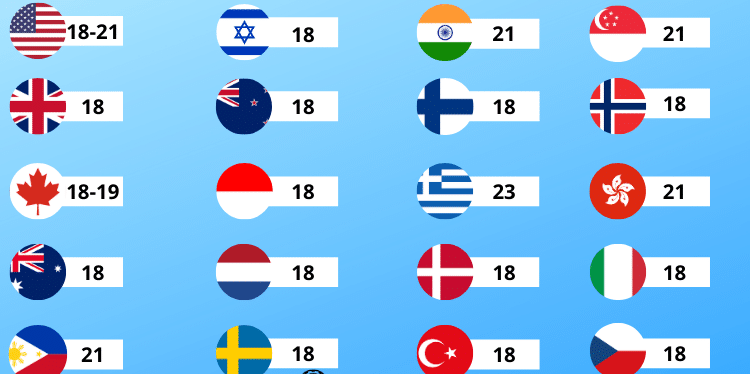In the thrilling world of casinos and online betting platforms, the legal gambling age serves as the gatekeeper, ensuring that participants are of a mature and responsible age to engage in such activities. The legal age acts as a pivotal point, defining the boundary between youthful exuberance and the responsibility that comes with the wagering landscape. It is imperative to understand the significance of the legal gambling age, as it plays a crucial role in safeguarding both the industry and the individuals involved.
Legal Gambling Age: A Fundamental Pillar
The term “legal gambling age” is not just a bureaucratic requirement; it is a protective measure designed to shield vulnerable demographics from the potential risks associated with gambling. Across various jurisdictions, the legal gambling age acts as a common thread, weaving its importance into the fabric of gambling regulations and policies.
As we delve into the complexities of the legal age, it becomes apparent that this boundary is not arbitrary. Rather, it is a well-thought-out decision grounded in societal norms, psychological considerations, and the potential impact of gambling on the lives of individuals. Ensuring that participants are of legal age is a collective effort to strike a balance between the thrill of gambling and the need for responsible gaming practices.
The Legal Gambling Age: A Global Tapestry
The legal age is not a one-size-fits-all concept; it varies across countries and regions. In the United States, for example, the legal gambling age is typically set at 21, ensuring that individuals are of legal adulthood before participating in activities like casino gaming and sports betting. Contrastingly, other countries may establish the legal age at 18, aligning it with the age of majority.
This divergence in legal age requirements highlights the diverse approaches taken by different nations to address the challenges posed by gambling. While some countries believe that 18 is a suitable age for individuals to make informed decisions about gambling, others opt for a more cautious approach, allowing participation only at the age of 21.
Ensuring Compliance: Legal Age Verification
As the gambling industry continues to evolve, stringent measures are implemented to ensure compliance with the legal age. Whether in brick-and-mortar casinos or online platforms, age verification mechanisms are in place to ascertain that participants meet the requisite age threshold.
For Slot Online gambling platforms, the verification process often involves submitting identification documents to prove age and identity. This meticulous approach is vital in preventing underage gambling and fostering a secure environment for all participants. The legal age serves as a protective shield, and adherence to these age verification processes is instrumental in upholding the integrity of the industry.
The Intersection of Technology and Legal Gambling Age

In the contemporary era, technological advancements have given rise to online gambling platforms, providing unprecedented accessibility to individuals worldwide. This digital landscape has brought about new challenges in enforcing the legal age, as geographic boundaries become less significant in the virtual realm.
However, it is worth emphasizing that the legal gambling age remains a steadfast requirement, even in the online domain. Stringent measures, such as advanced age verification technologies and geolocation services, are employed to ensure that participants comply with the legal age regulations. The integration of these technologies underscores the commitment of the industry to responsible gaming practices.
The Social Implications of Legal Gambling Age
Beyond its regulatory function, the legal gambling age also carries significant social implications. It acts as a tool to mitigate the potential negative consequences of gambling, especially for those who may be more susceptible to its allure. By establishing a legal age, society acknowledges the need to protect younger individuals from the pitfalls of excessive gambling and its potential impact on mental health and financial stability.
Incorporating Education into Legal Gambling Age Policies
While the legal age is a critical component of responsible gaming, it should not be viewed in isolation. Education plays a pivotal role in promoting awareness about the risks associated with gambling and fostering a culture of responsible gaming. Governments, industry stakeholders, and advocacy groups can collaborate to implement educational campaigns that empower individuals to make informed decisions regarding their participation in gambling activities, regardless of the legal gambling age.
Balancing Thrill and Responsibility: Legal Age in Perspective
The legal age is not a mere bureaucratic hurdle; it is a collective effort to strike a delicate balance between the excitement of gambling and the responsibility that comes with it. It acts as a safeguard, protecting the vulnerable while allowing mature individuals to engage in these activities responsibly.
Conclusion
In conclusion, the legal age is an integral aspect of the gambling landscape, serving as a protective barrier and a symbol of responsible gaming. Its significance spans across geographical boundaries and technological advancements, emphasizing its universal relevance. As the gambling industry continues to evolve, maintaining a steadfast commitment to enforcing and respecting the legal age is paramount. By doing so, we can ensure that the thrill of gambling is enjoyed responsibly, fostering a safer and more sustainable gaming environment for all.
Also Read: Jackpot Mega App Real or Fake (2023) – Let’s Discuss!




